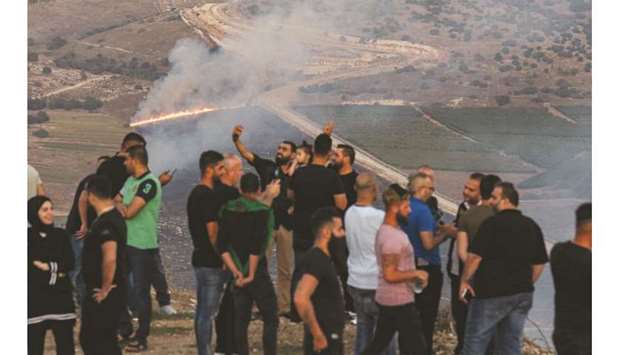Israel and Hezbollah exchanged fire along the Lebanese border yesterday after a week of rising tensions, sparking fears of an escalation and prompting UN calls for restraint.
There were no casualties reported and the violence subsided in the early evening.
Israel said it responded with around 100 artillery shells after Hezbollah fired two or three anti-tank missiles at a battalion headquarters and military ambulance, hitting both.
Israeli officials refuted Hezbollah claims that it had killed and wounded those inside the military vehicle, saying there were no casualties.
“We are consulting about the next steps,” Israeli Prime Minister Benjamin Netanyahu said.
“I have ordered that we be prepared for any scenario. We will decide on the next steps pending developments.”
After the exchange of fire began, Lebanon’s Prime Minister Saad Hariri contacted senior US and French officials to urge their countries and the international community to intervene.
France’s foreign ministry later said it was engaged in “multiple contacts” aimed at averting an escalation.
The head of the UN peacekeeping force in Lebanon called for “maximum restraint”. Israeli military spokesman Jonathan Conricus told journalists that the “tactical event” near Avivim, an Israeli community near the Lebanese border, was most likely over. But he said the “strategic situation is still ongoing”, meaning tensions with Hezbollah remained.
Conricus said Israel had targeted the squad that fired the missiles. Hezbollah said in a statement its fighters had “destroyed a military vehicle on the road to the Avivim barracks, killing and wounding those inside”. Hezbollah-affiliated Al-Manar TV said that the group’s attack targeted a Wolf armoured vehicle that can fit eight soldiers.
After the initial reports of fire from Lebanon, an Israeli military spokesman said Israelis living within four kilometres of the Lebanese border should remain at home and prepare shelters. Conricus said later that there were no longer any special instructions for civilians.
Tensions have risen in the last week between Israel and its Hezbollah. Hezbollah chief Hassan Nasrallah said Saturday his movement had decided to respond to an alleged Israeli drone attack on the group’s Beirut stronghold.
The pre-dawn August 25 attack involved two drones – one exploded and caused damage to a Hezbollah-run media centre and another crashed without detonating due to technical failure. Israel has not claimed responsibility for the incident, which came just hours after it had launched strikes in neighbouring Syria to prevent what it said was an impending Iranian drone attack on the Jewish state.
Hezbollah says two of its members were killed in that strike. A source connected to Hezbollah called yesterday’s missiles a response to those deaths and said a response to the alleged drone attack would take place in the air, alluding to a confrontation with Israeli drones. Israel has carried out hundreds of strikes against what it says are Iranian and Hezbollah sites in Syria since the civil war began there in 2011.
It has pledged to prevent its main enemy Iran from entrenching itself militarily in neighbouring Syria.
Iran and Hezbollah, along with Russia, have backed Syrian President Bashar al-Assad in the conflict. But a drone attack by Israel inside Lebanon would mark a departure – what Nasrallah had called the first such “hostile action” since a 2006 war between them.
That conflict took the lives of 1,200 Lebanese, mostly civilians, and more than 160 Israelis, mostly soldiers. UN peacekeeping force UNIFIL called yesterday for “utmost restraint” after what it called a “serious incident” that violated the UN resolution ending the 2006 conflict.
But mission head Major-General Stefano Del Col added that “general calm has been restored in the area and the parties have reassured me of their continued commitment to the cessation of hostilities.”

People flash the victory gesture as they pose for a u201cselfieu201d photo on a cell phone while others watch as fires blaze along the Lebanese side of the border with Israel in the Lebanese village of Maroun al-Ras, yesterday, following an exchange of fire between Hezbollah and Israel.
